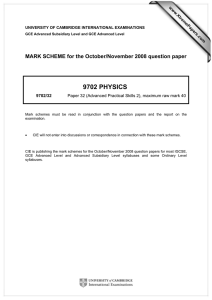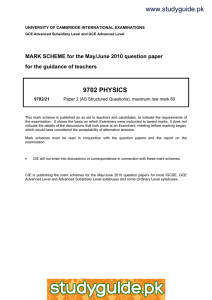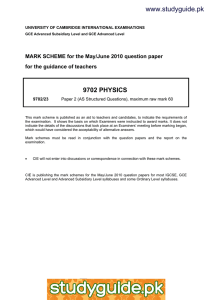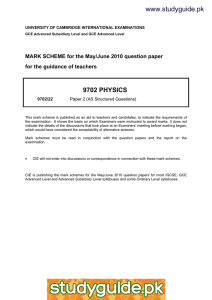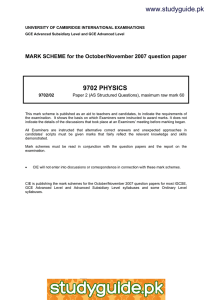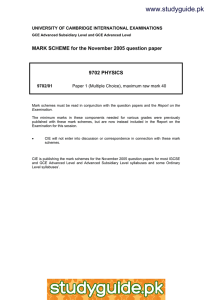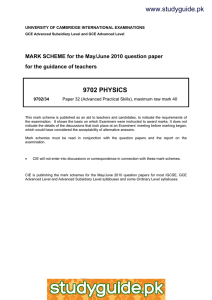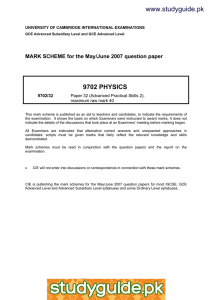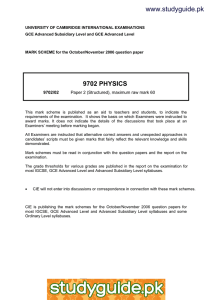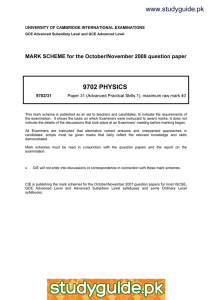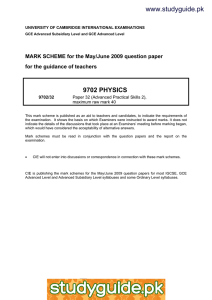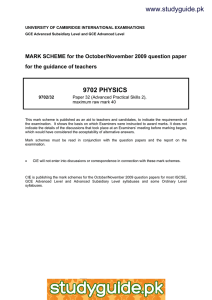www.studyguide.pk 9702 PHYSICS
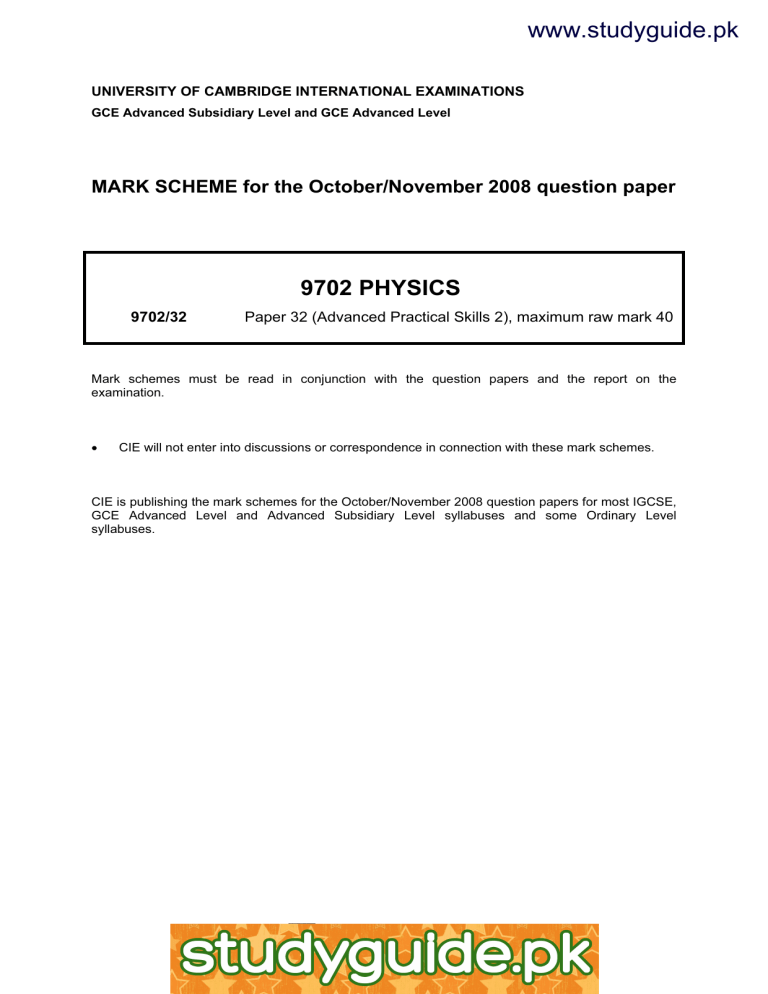
www.studyguide.pk
UNIVERSITY OF CAMBRIDGE INTERNATIONAL EXAMINATIONS
GCE Advanced Subsidiary Level and GCE Advanced Level
MARK SCHEME for the October/November 2008 question paper
9702 PHYSICS
9702/32
Paper 32 (Advanced Practical Skills 2), maximum raw mark 40
Mark schemes must be read in conjunction with the question papers and the report on the examination.
• CIE will not enter into discussions or correspondence in connection with these mark schemes.
CIE is publishing the mark schemes for the October/November 2008 question papers for most IGCSE,
GCE Advanced Level and Advanced Subsidiary Level syllabuses and some Ordinary Level syllabuses. www.xtremepapers.net
Page 2 Mark Scheme www.studyguide.pk
Syllabus Paper
GCE A/AS LEVEL – October/November 2008
(ii) θ . 5 Y θ Y 10° Ignore d.p.
(b) Six sets of readings scores 6 marks, five sets scores 5 marks, etc.
9702 32
[1]
Help given, –1 (e.g. putting plumbline into position).
Generally wrong trend, –1. Allow n = 0. [6]
Range. Maximum angle θ max
[ 45°. [1] headings. θ (°) No unit for 1/cos θ .
[1]
Consistency in raw data – all values of θ given to the nearest 1° or 0.5°. [1]
Calculated quantities. Allow small rounding errors.
– check the specified value of 1/cos
θ
and tick if correct.
Specified value is the largest value of θ .
[1]
[1] Significant figures.
– all values of 1/cos θ should be to the same s.f. as (or one more than) the raw value of θ .
Quality of data.
5 points close to Examiner’s straight line.
Wrong trend/curved trend – no mark.
(c) Points should occupy at least half the grid in both directions and scales should be sensible
(not 3, 6, 9 or other awkward) and labelled with a quantity.
Do not penalise reversed axes. Label FO. Ignore units.
Check that one point is correctly plotted (error Y half a small square).
All tabulated results to be plotted on graph grid.
Do not allow blobs (points [ half a small square).
If plot incorrect indicate correct position.
Line of best fit.
[1]
[1]
[1]
At least 5 trend plots. Allow curved trend.
No hairy or thick lines (
[
half a small square). No kinks.
(d) Gradient.
Triangle chosen for gradient as a hypotenuse at least half the length of the drawn line.
[1]
Read-offs are on the line correct to within half a small square and correct substitution.
Gradient mark = 0 if curve used. If wrong write in correct read-off. Correct sub into ∆ y / ∆ x . [1]
Intercept calculated by a correct method or using the graph.
Allow for extrapolation for curve at n = 0 (i.e. do not allow algebraic errors with y = mx + c). [1]
(e) Correct method and substitution. k
equal to
gradient
2 m
. [1]
Method and value of M within 50 % of Supervisor’s value.
M = intercept / k.
Allow e.c.f. for k.
Write in Supervisor’s value for M underneath. [1]
[Total: 20]
© UCLES 2008 www.xtremepapers.net
Page 3 Mark Scheme www.studyguide.pk
Syllabus Paper
GCE A/AS LEVEL – October/November 2008
2 (b) (i) Measurement of 19.0
Y l Y
21.0
cm. Ignore d.p.
9702 32
[1]
(ii) Correct method of estimation of percentage uncertainty.
∆ l
= 1 mm or 2 mm or half the range.
(iii) Correct calculation of first value of l 3
(20³ = 8000).
If incorrect write in correct value. Accept small rounding errors.
(iv) Justification for s.f. for l 3 .
Same or one more than the raw value of l .
Consistent with their own data.
[1]
[1]
[1]
(c) Measurement of 0.2 Y T Y 2.0
s [1]
(c) or (d) Measurement of raw t to the nearest 0.1
s or 0.01
s. [1]
Evidence of repeat readings of t.
[1]
Evidence [ 10 oscillations. [1]
(d) Measurement of second l to nearest mm.
Measurement of second T
(d)
I T
(c)
. Penalise wrong trend.
[1]
[1]
(e) Correct method and calculation of k values.
Valid comment on whether equation applies to results.
Allow e.c.f. on arithmetic errors of k
values. Evidence of correct ratio for one value of k
is necessary to access this mark. k
values within 10% to support relationship. Allow up to 20% if candidate stated a value.
[1]
[1]
(f) (i) Problems [4]
A p
Not enough readings (to draw a conclusion). A s
More readings and plot a graph.
B p
Time too fast/moves too fast/error in timing large compared to time measured.
B s 1
Video recorder, playback frame by frame/ slow motion with timer/stroboscope with scale.
C p
Judging beginning/end of oscillation/complete oscillation.
B s 2
Longer hacksaw blade/heavier mass (to increase time of oscillation)/more oscillations than already used (larger n
).
C s
Motion/position sensor placed at side of mass/fiducial marker/(stationary) reference marker and stated purpose.
D p
Length error e.g. parallax error in reading the ruler/difficulty in establishing centre of mass/ ends of blocks.
E p
Difficulty in setting up the apparatus horizontally/difficulty in assembly with detail.
D s
Find the mid-point of the mass by finding the distance to both ends and taking an average/ thinner rule with reason/scale starts at 0 cm with reason/scale on blade/corrections for parallax error.
E s
Use spirit level/measure up from bench/ partner to help with set up.
[Total: 20]
© UCLES 2008 www.xtremepapers.net
